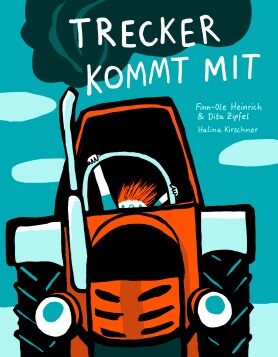Finn-Ole HeinrichDita ZipfelHalina Kirschner
Trecker kommt mit
[Not Without my Tractor!]
- mairisch
- Hamburg 2017
- ISBN 978-3-938539-48-4
- 32 Pages
- 3 Suitable for age 4 and above
- Publisher’s contact details
Sample translations
The thousand lives of a tractor. Hymn to a farmyard machine and its diminutive champion
The son’s response: ‘Blow packing! I say: did that ages ago! There’s one thing I’m taking, and one thing only: Tractor. Because everything’s completely pointless without Tractor. TRACTOR’S COMING TOO! Or I’m staying here.’ - Everything sorted, then. All done and dusted, apparently. Except that the boy’s not sorted. There he sits, with his arms firmly folded and his head in a cardboard box, surrounded by open boxes, random toys, and a swirl of thoughts. One thing is clear, though: he’s not going anywhere without Tractor.
Anyone who has been a small child themself (and that should include most of us), or anyone who has witnessed the passionate attachments of their own children or grandchildren during their pre-school years, will know the fascination that this particular kind of vehicle holds for young boys in particular. After ‘Mummy’, ‘Daddy’, ‘poo’, ‘car’ and ‘brum-brum’, one of the next few words is very likely to be ‘tractor’. If subsequently in the locality mounds of earth or heaps of sand need to be tackled, levelled, bulldozed or re-deployed, then Tractor with his big bucket on the front will be needed before the tipper truck can do its work. Such things are an essential part of the child’s preparation for a successful life. And countless other tasks arise for Tractor during a child’s early years. And if it so happens that there’s also a real tractor standing there in the barn nearby: what heaven!
This is the privileged starting point for the book’s stubborn little hero: there’s a REAL tractor out in the barn! And with it a thousand real-life possibilities: whizzing about; just standing still; looking on; chugging through the woods; digging a hole for a lake; driving a tunnel through the mountain. ‘But what about in the city?’ his Papa asks - and his son replies: ‘What sort of a place is that if there’s no room for Tractor?? What an earth are you thinking of? [...] TRACTOR’S COMING TOO!’
Our little tractor driver - of whom the illustrations depicting him in the tractor’s driving seat show at most his mop of hair and the tip of his nose - instantly turns himself into a passionate if rough and ready poet: ‘Fun in the fields, noises in the night, off into the deep dark woods, roaring through rot and rust and rubbish.’ He then launches into an equally lyrical hymn to Tractor’s potential feats in the city, and it’s a sheer delight for the reader to recite the words that Heinrich and Zipfel have put in his mouth with such great care.
It’s all as clear as daylight. And so is the story’s message: there’s nothing to match the stubbornness of a little tractor driver. And that’s the way it’s been for generations. For there’s nothing to match a varied and colourful life in the countryside, complete with cows, geese - and Tractor. And if it has to be city life, then only with... (see above!) But neither the particular issue nor the message is the most important characteristic of this picture book. No: what stands out is its unique combination of madcap poetry, jauntily rhythmic sentences, and a sharply focused, no-nonsense pictorial idiom, all of which give it a cheeky, cheerful, bullish air and a sense of being true to life - albeit the outcome of the communicative interaction is left completely open.
Translated by John Reddick

By Siggi Seuß
Siggi Seuß, freelance journalist, radio script writer and translator, has been writing reviews of books for children and young people for many years.
Publisher's Summary
Hey! Why on earth shouldn’t Tractor be allowed to come with us when we move from the country to the city? It’s bad enough having to move at all - and to the city, of all places! But anyway: Tractor has to come with us, that’s obvious. ’Cos there are loads of extemely good reasons why a tractor’s absolutely essential when you live in a city. Take shopping for instance: a tractor’s dead handy when you have to buy a really big load of stuff. Or if you get caught in traffic jam it’s as easy as pie to make space for yourself instead of having to sit there like an idiot behind all the other cars. So what I say is: Tractor’s coming too!
Finn-Ole Heinrich, an author who has already garnered numerous awards, scored successes with his Frerk, du Zwerg [Frerk, you dwarf] and his trilogy Die erstaunlichen Abenteuer der Maulina Schmitt [The astonishing adventures of Maulina Schmitt], and now for the first time he has teamed up with Dita Zipfel to write a book aimed at very young children - as anarchic, wild, intrepid and bold as ever. And even as an adult city-dweller we find ourselves asking how we’ve actually managed to cope thus far without a tractor.
With her silk-screen style and vivid colours the Leipzig illustrator Halina Kirschner has provided the story with a powerful sequence of images.
(Text: mairisch)
